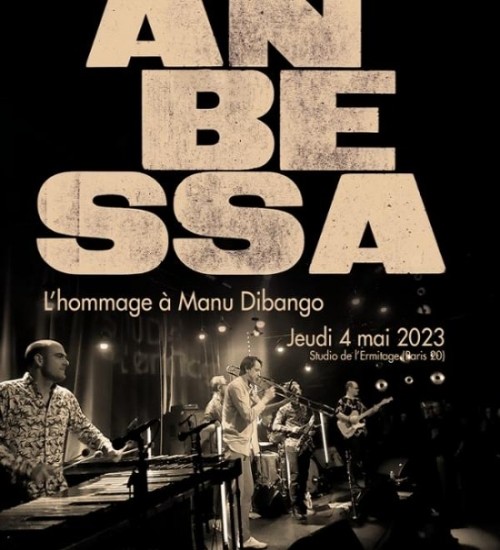
by Colin May
August 03, 2023
/ LIVE
Guest contributor Colin May with a belated look at this energetic and enjoyable tribute to Afro-jazz pioneer Manu Dibango by the France based sextet Anbessa.
ANBESSA: Homage to Manu Dibango
Studio de l’Ermitage, Paris
4 May 2023
David Georgelet - Drums
Benoit Lavollée - Vibraphone, Marimba
Stéphane Mmontigny - Bass Trombone
Oliver Zanot - Saxophone
Loïc Rechard - Lead Guitar
Oliver Degabriele - Bass Guitar
Anbessa are well qualified to play homage to Manu Dibango (1933-2020),who is often cited as a pioneer of Afro-Jazz. Three of the band also are members of Ethio-jazz group Akalé Wubé who played and recorded with Dibango after meeting him when both parties were on a French radio show in December 2013 that celebrated the ‘Lion of Africa’s’ 80th birthday.
Dibango is best known for ‘Soul Makossa’. Recorded as the B side of a song for the 1972 African Cup of Nations football tournament it became an international hit and two decades later it earned it’s composer a significant out-of-court settlement from Michael Jackson, who had used the refrain without Dibango’s permission.
The instrument most frequently associated with Dibango is the sax. But also he played marimba and keyboards, sang and was a prolific composer and arranger. He made between 40 and 200 albums according to different obituaries, one being a collection of marimba tracks that was sub-titled “No Sax”.
While celebrated for bringing together jazz, funk and the music of his Cameroonian homeland, Dibango ranged over many styles from hip hop to classical. In 2019 in the
sixth decade of his career, he worked with Symphonic Safari on merging jazz and classical. He was a regular visitor to UK, and I saw him in London in 2007. He
played at Brecon Jazz Festival in 2009, a concert that was reviewed by The Jazz Mann.
(https://www.thejazzmann.com/features/article/sunday-at-brecon-jazz-festival-9th-august-2009)
Anbessa want to make Dibango’s music more widely known by “presenting on stage the repertoire of Manu. Repertoire too little known and often reduced to only ‘Soul Makossa’.” They underline this message by omitting ‘Soul Makossa’ from their set.
Like Dibango they play in a number of different styles. What all the tunes have in common is strong melodic appeal and the music always seeming to have a smile on its face, which is very much in the spirit of ‘The Lion of Africa’.
The opening number starts deceptively with Oliver Zanot’s rather meditative contemporary sax phrasing which becomes a blistering solo. But this is only a prelude to the number taking an R’n’B and rock turn led by Oliver Degabriele’s bass guitar and Benoit Lavollée percussive marimba playing.
This is followed ‘Anbessa,’, (The Lion in Amharic) the number from which the group takes it’s name and the one number in the set not by Diabango but written by band
members as a tribute to him. There’s a burst of wah wah guitar from Loïc Rechard and Ethiopian-jazz brass lines inspired by Ethiopian jazz of the 1960’s. At the beginning of the next number, we are taken briefly to a South African township before the sound veers more towards that of a New Orleans marching band.
‘Lagos Go Slow’ is a tongue-in-cheek soundscape of traffic chaos in Nigeria’s largest city which features a cow bell and a rasping trombone solo from Stéphane Mmontigny’.You can hear honking horns and reeving engines, and sense the drivers’ frustration.
‘Otetena Munja,’ has been rearranged by the band as a slow gospel/spiritual ballad with Loïc Rechard’s guitar taking the lead (as the preacher?) and with the brass the chorus (the choir or congregation perhaps?).
Next comes ‘Africa Pop Session’ which the band say is the first number they ever played with Manu Dibango, and is a mix of laid back pop and light touch Ethio-jazz.
‘Coco in Central Park,’ is Dibango’s portrait of his wife, and ‘Ekedy’ is the most pure contemporary jazz number in the set, with the band playing interlocking solos very freely yet keeping it tight.
Then there’s a sequence of high energy numbers that build rock style to a big finale, beginning with the raucous, very danceable ‘Di Ma Dangwa,’ the quiet ending of which comes as surprise.
From then on it’s party time. Bass trombonist Stéphane Mmontigny throws dance floor shapes while stretching the musical possibilities of his instrument to extremes, his moves contrasting with guitarist Loïc Rechard who stands stock still while he’s soloing.
The final numbers feature a thunderous drum solo from David Georgelet, and dynamic marimba and vibraphone soloing from Benoit Lavollée’. By now many of the audience
have responded to the band’s encouragement to dance and to join in with a chanted chorus. It all adds up to a joyous finale.
The quality and the joie de vivre of the individual and the ensemble playing made this very enjoyable gig. Anbessa show that they and this repertoire could be the perfect festival double act, and if the ‘Lion of Africa’ was listening and watching from somewhere he’d have joined in the applause.
Set list (thanks to Benoit Lavollée)
Bush A Bush,
Anbessa,
Peaceful Homeland,
Lagos Go Slow,
Colere Des Dieux,
Otetena Munja,
African Pop Session,
Coco In Central Park,
Ekedy,
Di Ma Dangwa,
The Panther,
Aloko Party,
Electric Africa.
COLIN MAY